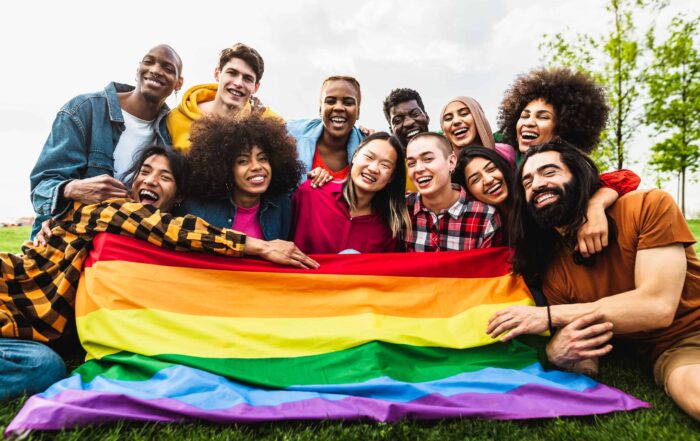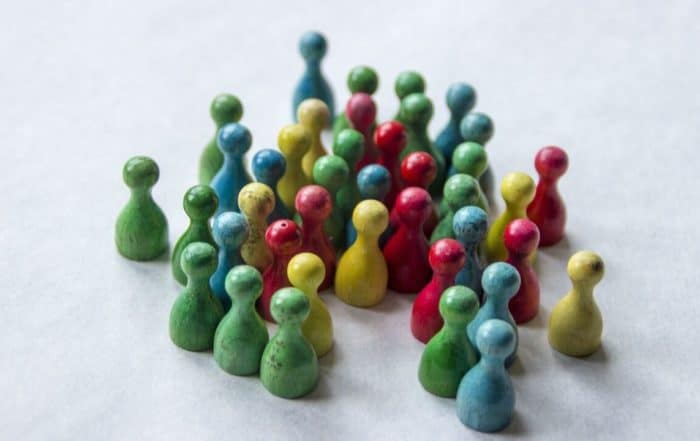Dr. Gray Atherton, Ph.D., explores the connection between autism and anthropomorphism. She provides a brief historical and social context for anthropomorphism in our daily lives before diving into the prevalence and advantages of anthropomorphism in autism. The speaker details recent studies that challenge prevalent theories about socialization, Theory of Mind, and anthropomorphism in autism. Atherton asserts that many autistic people use anthropomorphism prolifically in everyday life and often outperform their non-autistic peers in this aspect of Theory of Mind. The presenter highlights anthropomorphism as a strength for many autistic individuals and suggests using it to support learning and interventions for autism.
Handouts are online (.pdf) HERE
In this webinar:
1:58 – What is anthropomorphism?
5:00 – Importance of anthropomorphism
8:05 – Autism and anthropomorphism
10:00 – Social Motivation Theory of Autism
14:00 – Study 1: Theory of mind processes in autistic adolescents
18:50 – Study 2: Review of studies with anthropomorphic stimuli
23:45 – Study 3: Reading the Mind in the Eyes Test – anthropomorphized
29:00 – Study 4: Intellectual disability and emotion recognition
32:25 – Study 5: Verbal anthropomorphism and theory of mind
35:30 – Study 6: Pets and anthropomorphism in everyday life
39:50 – Recap
41:30 – Flip the narrative
46:00 – Applications and interventions
48:20 – Q & A session
History and importance of anthropomorphism
Atherton defines anthropomorphism as the attribution of human-like qualities, emotions, or behaviors to non-human entities, such as animals or objects (1:58). Examples of anthropomorphism are seen throughout history in our deities and legends, who often assume human characteristics. The speaker explains the importance of anthropomorphism in religion, connection, and socialization. She explains that wanting to understand something that isn’t human drives us to anthropomorphize and highlights that anthropomorphism is frequently related to loneliness (5:00). Atherton touches on the presence of anthropomorphism in childhood media and notes its increasing use in contemporary care work and technology (6:25).
Autism and Anthropomorphism
The presenter discusses the Social Motivation Theory of Autism and outlines publications supporting the claim that autistic people are less socially motivated than their peers (9:00). Theory of Mind (ToM), or the capacity to ascribe emotions to other people based on facial expressions and personal characteristics, is closely related to anthropomorphism. Atherton outlines a study that tested ToM in relation to a video of moving shapes. Results showed that non-autistic respondents used human-like adjectives to describe the shape interactions, while autistic participants used more concrete descriptives and less mental state language (10:56). Given the contrast in responses, researchers concluded that autistic people have lower ToM and are less likely to anthropomorphize or use human-like descriptors. Atherton describes her own professional experiences with autistic individuals as totally contrary to these assumptions and asserts the need for further exploration into ToM and autism (12:10).
Study 1: Theory of Mind processes in autistic adolescents
To explore the Theory of Mind experiences of autistic adolescents, the speaker conducted an open-response interview and interpretive phenomenological analysis (14:00). The study revealed four overarching themes concerning how autistic people engage with ToM processes: honesty, humor, visualization, and anthropomorphism (15:00). Atherton presents sub-themes and quotes from participants that reflect their prolific use of anthropomorphism in daily life. She asserts that these findings challenge accepted notions that autistic people have low ToM and social motivation (17:23).
Study 2: Review of investigations with anthropomorphic stimuli
Although anthropomorphism isn’t often explicitly studied, many investigations use anthropomorphic stimuli as a control in comparative studies (18:50). In reviewing such studies, the speaker found that autistic individuals perform significantly better on ToM tests when the stimuli are non-human instead of human (20:00). She outlines three publications that revealed:
- Autistic people prefer anthropomorphized images over human ones.
- Autistic people actually have an advantage in this area of ToM compared to their non-autistic peers.
- This advantage may have to do with the expertise or familiarity that autistic people have with non-human social agents (22:30).
Study 3: Reading the Mind in the Eyes test – anthropomorphized
Reading the Mind in the Eyes test (RME) is a classic ToM exercise where participants determine emotions based on photos of a person’s eyes. Atherton and colleagues created a cartoon (anthropomorphic) version of the RME and compared autistic and non-autistic group responses for both versions (23:45). Results showed that the non-autistic group had higher success on the human RME test but that the autistic participants outperformed their counterparts on the cartoon test (27:00). These results, the presenter posits, suggest that anthropomorphism may be a strength for autistic individuals, further challenging the preconceived notions that autistic people have low ToM and emotion recognition capabilities.
Study 4: Intellectual disability and emotion recognition
Around 40% of autistic individuals also have some co-occurring intellectual disability, and many are non-verbal. Atherton explains how communication barriers often exclude this part of the autistic community from research participation (28:00). She outlines a recent study that took these differences into account and assessed whether the prolific use of anthropomorphism revealed in previous studies defines the entire autism spectrum (29:00). Researchers used a combination of human faces and animal face filters to test ToM. They found a significant increase in correct answers for the photos with animal filters on them, suggesting participants better understand anthropomorphized stimuli compared to human faces (31:20). The presenter discusses study limitations, noting the aspect of visual salience.
Study 5: Verbal anthropomorphism and theory of mind
To see if anthropomorphism extends beyond visual context, Atherton and colleagues used a verbal ToM Faux Pas test (32:25). They tested participants’ ability to determine whether someone said something awkward in both human and anthropomorphized stories provided in text. Similar results to previous studies were found: autistic people struggled with human-based wording but performed at the same level as, if not better than, the non-autistic group with anthropomorphized stories (34:00). Atherton asserts that these findings suggest anthropomorphism may play a critical role in how autistic people engage in perspective-taking and conceptualize ToM.
Study 6: Pets and anthropomorphism in everyday life
As human beings, we often anthropomorphize our pets to relate to them and create connections. Atherton describes a study on differences between autistic and non-autistic groups in their anthropomorphism of pets. Results showed that the autistic group was equally attached to their pets and used similar amounts of anthropomorphism as their non-autistic counterparts. Interestingly, the presenter states, Autism Quotient scores correlated with anthropomorphism and autistic people were more likely to substitute pets for people (mediated by social avoidance) (35:30). Interpretive phenomenological analysis of 16 interviews with autistic pet owners showed that pets can often act as a social alternative and/or a social lubricant. Participants frequently noted that with animals, “you don’t have to wear a mask – they don’t know what social rules you may be breaking” (37:15).
Atherton states that these real-life examples show how autistic individuals intentionally create anthropomorphic connections to compensate for social deficits or avoidance. These intentional connections manifest in various ways, from donating to animal charities to becoming a cat behaviorist. The speaker asserts that we need to understand anthropomorphism as a strength and something that autistic people may be particularly good at. Perhaps, she continues, they are engaging with and becoming experts in anthropomorphism because it’s a way to have connections that don’t feel judgmental or forced (39:00).
The big picture
The speaker summarizes the presentation, highlighting that evidence suggests autistic people anthropomorphize at least to the same degree as their non-autistic peers and that anthropomorphism may play a role in the way autistic people conceptualize or engage in ToM and perspective-taking (39:50). She presents a diagram of the Social Motivation Theory and suggests that we flip the narrative. Instead of saying autistic people have decreased human/social motivation or recognition, we can say they have increased non-human attention to faces and understand non-humans much more (41:30).
The presenter notes that anthropomorphism may vary across developmental stages and cites a multi-age study where anthropomorphism decreased with age (44:15). She suggests leveraging anthropomorphic stimuli, like cartoons, in educational and therapeutic settings with autistic individuals. For example, a pilot study using Hololens glasses is underway, which could allow for more meaningful interactions using anthropomorphism and digital projections (46:00). Atherton invites viewers to share their real-life experiences with anthropomorphism and provides her contact information (47:15) before beginning the Q & A session (48:20)
The speaker:
 Gray Atherton, PhD, has a BSc in Child Development from Vanderbilt University, a Master’s in Counselling from University of Houston, and a Ph.D. in Educational Psychology and Individual Differences from University of Houston. She has previously lectured at University of Houston and the University of Wolverhampton. Prior to entering academia, Gray was a counselor for adolescents with neurodevelopmental conditions. “I am interested in understanding how people with autism spectrum condition see the social world. Specifically, I explore individual differences in social processing and how these differences often found in people with autism also exist in the general population. I also investigate anthropomorphism, or seeing the human in the non-human, and how this relates to social processing in autism. To investigate this I am developing virtual reality techniques that allow for anthropomorphic experiences. My other research interest lies more broadly in embodied social processing. I am particularly interested in how movement can affect the way we see ourselves and our social partners, and how this can be used to understand special populations.”
Gray Atherton, PhD, has a BSc in Child Development from Vanderbilt University, a Master’s in Counselling from University of Houston, and a Ph.D. in Educational Psychology and Individual Differences from University of Houston. She has previously lectured at University of Houston and the University of Wolverhampton. Prior to entering academia, Gray was a counselor for adolescents with neurodevelopmental conditions. “I am interested in understanding how people with autism spectrum condition see the social world. Specifically, I explore individual differences in social processing and how these differences often found in people with autism also exist in the general population. I also investigate anthropomorphism, or seeing the human in the non-human, and how this relates to social processing in autism. To investigate this I am developing virtual reality techniques that allow for anthropomorphic experiences. My other research interest lies more broadly in embodied social processing. I am particularly interested in how movement can affect the way we see ourselves and our social partners, and how this can be used to understand special populations.”
Take the knowledge quiz
Can’t see the quiz below? Take it online HERE
LGBTQIA+ and Autism
Contemporary research on the intersection of autism, sexuality, and gender identity asserts that autistic individuals are more likely to identify as LGBTQIA+ than the neurotypical population. Similarly, the prevalence of autism is
ASD Support: The Ins and Outs of Dating
Dr. Aarti Nair discusses the ins and outs of dating as it specifically applies to individuals with autism. She considers the need for teaching such skills to autistic adults and answers common questions
Understanding Social Development in ASD
Dr. Matthew D. Lerner, Ph.D., discusses social development in individuals with autism. He emphasizes understanding theoretical mechanisms that underly processes generally accepted as social “skills.” The presenter outlines recent findings and discusses their implication
Evidence Basis for Teaching Social Skills
Aarti Nair, Ph.D., is a postdoctoral fellow with the UCLA Ahmanson-Lovelace Brain Mapping Center and the UCLA PEERS® Clinic at the Semel Institute for Neuroscience
Social Skills
Presented by Mina Park, PhD at the Fall 2012 Autism Research Institute Conference In this interactive and lively presentation, Dr. Park provides an overview of PEERS, an empirically supported social skills program for






